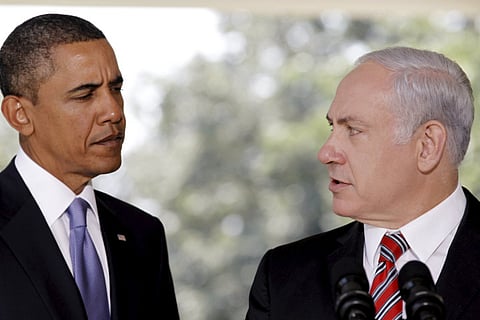US omits pro-Israel address at UN conference
Move follows US warning that it may ‘reassess’ relations with the Israeli regime

Geneva: The United States will not take the floor at the main UN human rights forum on Monday during the annual debate on violations committed in the Palestinian territories, a US spokesman said.
The move at the 47-member state forum where Washington unfailingly defends Israel, follows signals that the Obama administration is undertaking a “reassessment” of relations with the Israeli regime.
The last time that Washington spoke under that stand-alone agenda item was in March 2013, UN records show.
“The US delegation will not be speaking about Palestine today,” a US spokesman in Geneva said in response to a query as the debate began. He declined further comment.
Israeli Prime Minister Benjamin Netanyahu’s allies acknowledged on Sunday that his election-eve disavowal of a Palestinian state had caused a rift with the White House, but blamed US President Barack Obama’s unprecedented criticism on a misunderstanding. Israel’s representative was conspicuously missing when the UN Human Rights Council started a special session on Monday on the situation in the Palestinian territories and the 2014 Gaza conflict.
“I note the representative of Israel is not present,” said council president Joachim Ruecher.
Israel provided no immediate explanation for not being present at the session dedicated overwhelmingly to discussion of its policies and alleged abuses, but a source close to the council said its absence clearly amounted to a boycott.
“We won’t comment on that,” a spokeswoman with the regime’s mission in Geneva said.
Monday’s session had originally been scheduled to discuss a probe on the 50-day war in Gaza last year, but the investigators obtained a delay after the head of the team quit under Israeli pressure.
‘Process cannot be rushed’
“The process cannot be rushed,” former New York judge Mary McGowan Davis, who has taken over as head of the team, told the council.
Canadian international law expert William Schabas resigned as chair of the Commission of Inquiry on the 2014 Gaza conflict last month after Israel complained he could not be impartial because he had prepared a legal opinion for the Palestine Liberation Organisation in October 2012.
Schabas strongly denied that he was beholden to the PLO but said he was reluctantly stepping down to avoid the inquiry into the July-August conflict — commissioned by the UN Human Rights Council — being compromised in any way.
Israel is the only regime with a special agenda item dedicated to it, meaning its rights record is discussed at every session of the UN’s top rights body.
Monday’s session came after Netanyahu’s right-wing Likud party scored an unexpected election victory last week.
The US absence on Monday sparked speculation over whether it aimed to avoid having to stick up for Israel, as it usually does, amid cooling relations between the two allies.
Washington warned last week it could withdraw its unwavering support for Israel at the UN over Netanyahu’s tough stance on the Palestinians.
A number of states meanwhile saw the absence of the United States and most western nations from Monday’s debate in a different light.
Although the report on the 2014 Gaza war investigation was delayed until June, the UN’s new Special Rapporteur on the situation in the Palestinian territories did not hold back.
“The ferocity of destruction and high proportion of civilian lives lost in Gaza cast serious doubts over Israel’s adherence to international humanitarian law principles of proportionality, distinction and precautions in attack,” Makarim Wibisono told the council.
He lamented “acute” needs in Gaza, warning that Israel’s continued “blockade keeps Gaza in a stranglehold which does not even allow people to help themselves.”
The Gaza conflict ended with a truce between Israel and the territory’s Islamist de facto rulers Hamas on August 26 after the deaths of more than 2,140 Palestinians, most of them civilians, and 73 people on the Israeli side, mostly soldiers.
Sign up for the Daily Briefing
Get the latest news and updates straight to your inbox



